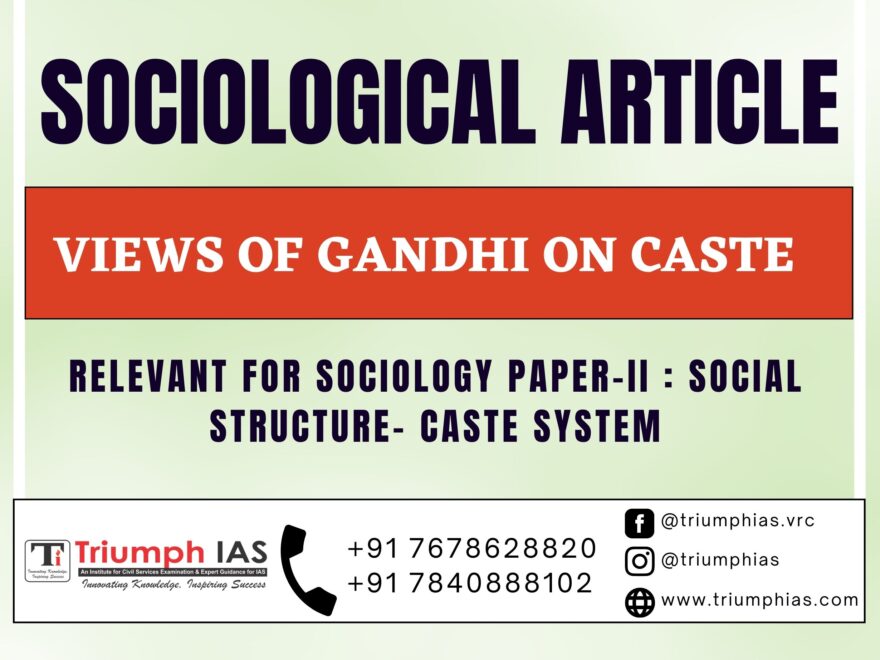Relevant for Sociology Paper-II : Social Structure- Caste System
In his younger years, Gandhi disagreed with some of Ambedkar’s observations, rationale and interpretations about the caste system in India. “Caste”, he claimed, has “saved Hinduism from disintegration. But like every other institution it has suffered from excrescences.” He considered the four divisions of Varnas to be fundamental, natural and essential. The innumerable sub-castes or Jatis he considered to be a hindrance. He advocated to fuse all the Jatis into a more global division of Varnas. In the 1930s, Gandhi began to advocate for the idea of heredity in caste to be rejected, arguing that “Assumption of superiority by any person over any other is a sin against God and man. Thus, caste, in so far as it connotes distinctions in status, is an evil.”
He claimed that Varnashrama of the shastra is today non-existent in practice. The present caste system is in theory antithesis of varnashrama. Caste in its current form, claimed Gandhi, had nothing to do with religion. The discrimination and trauma of castes, argued Gandhi, was the result of custom, the origin of which is unknown. Gandhi said that the custom’s origin was a moot point, because one could spiritually sense that these customs were wrong, and that any caste system is harmful to the spiritual well-being of man and economic well-being of a nation. The reality of colonial India was, Gandhi noted, that there was no significant disparity between the economic condition and earnings of members of different castes, whether it was a Brahmin or an artisan or a farmer of low caste. India was poor, and Indians of all castes were poor. Thus, he argued that the cause of trauma was not in the caste system, but elsewhere. Judged by the standards being applied to India, Gandhi claimed, every human society would fail.
He acknowledged that the caste system in India spiritually blinded some Indians, then added that this did not mean that every Indian or even most Indians blindly followed the caste system, or everything from ancient Indian scriptures of doubtful authenticity and value. India, like any other society, cannot be judged by a caricature of its worst specimens. Gandhi stated that one must consider the best it produced as well, along with the vast majority in impoverished Indian villages struggling to make ends meet, with woes of which there was little knowledge.
Gandhi’s views in regard to basic aspects of the caste system changed in the last years of his life. In the 1920s he had held that every Hindu “must follow the hereditary profession” and that “prohibition of intermarriage” between people of different varnas was “necessary for a rapid evolution of the soul.” But later he gradually became “a social revolutionist”, advocating intermarriage between Brahmins and Untouchables in order to dismantle the caste system “root and branch”, and acknowledging that “When all become caste-less, monopoly of occupations would go.” The changes were due in part to the influence of two opponents of the caste system whose integrity he held in high regard : Ambedkar and Gora. His view of marriage between people of different religious affiliations underwent a similar change.
Follow us :
🔎 https://www.instagram.com/triumphias
🔎https://www.youtube.com/c/TriumphIAS
https://t.me/VikashRanjanSociology
Find More Blogs
|
Scope of the subject and comparison with other social sciences |
|||
|
|
|
|
Modernity and social changes in Europe |
#Sociologyforupsc #sociologyforupscinhindi #sociologyforupscgs1 #sociologyforupscprelims #sociologyforupscinenglish #sociologyforupscmainsinhindi #sociologyforupscoptionalinhindi #sociologyforupscmains #sociologyforupscplaylist #sociologyforupsclecture1 #sociologyforupsccse #sociologyforupscoptional #syllabusofsociologyforupscoptional #bestbookforsociologyforupsc #sociologyoptionalforupscanswerwriting #sociologyoptionalforupscanukumari #sociologyoptionalforupscabhijeet #sociologyoptionalforupscanalysis #sociologyoptionalforupscalllectures #sociologysyllabusforupscanalysis


